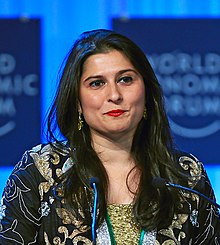SOC Films
| Sharmeen Obaid-Chinoy | |
|---|---|

Chinoy at the World Economic Forum, 2013
|
|
| Born |
12 November 1978 Karachi, Sindh, Pakistan |
| Nationality | Pakistani |
| Alma mater | Stanford University |
| Occupation | Filmmaker, journalist |
| Years active | 2000–present |
| Spouse(s) | Fahd Kamal Chinoy |
| Website | Official website |
Sharmeen Obaid-Chinoy (Urdu: شرمین عبید چنائے; born 12 November 1978) is a Pakistani journalist, filmmaker and activist. She is particularly known for her work in films that highlights the inequality with women. She is the recipient of several awards, including two Academy Awards, six Emmy Awards and one Lux Style Award. In 2012, the Government of Pakistan honoured her with the Tamgha-e-Imtiaz, the second highest civilian honour of the country, and Time magazine named her one of the 100 most influential people in the world.
Obaid-Chinoy was born and raised in Karachi, and studied at Karachi Grammar School before moving to the United States for higher education, where she received her bachelor's degree in journalism from Smith College in 2002. She returned to Pakistan and launched her career as a filmmaker with her first film Terror's Children for The New York Times. In 2003 and 2004 she made two award-winning films while a graduate student at Stanford University. Her most notable films includes, the animated adventure 3 Bahadur (2015), the musical journey Song of Lahore (2015) and the two Academy Award-winning films, the documentary Saving Face (2012) and the biographical A Girl in the River: The Price of Forgiveness (2016). Her visual contributions have earned her numerous awards, including two Academy Awards in the Best Short Subject in 2012 and 2016 and two Emmy Awards in the same category in 2010 and 2011.
...
Wikipedia
